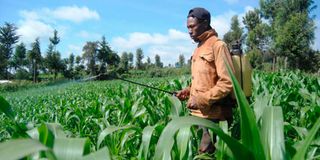Green Deal: Prioritise availability of food in AU-EU negotiations

A farmer in Elburgon, Nakuru County, sprays his maize crop with pesticide in June 2021.
What you need to know:
- Europe is largely food-secure as agriculture is hugely developed.
- In Africa, agriculture is still dominated by smallholders.
Food security in the East African Community (EAC) has been undermined in recent years by erratic rain patterns and virulent pests and diseases. With a population of over 200 million, there is a need for adequate nutrition. That would positively impact on the health of the population and strength of the businesses and economies.
Africa’s annual food import bill is $40 billion (Sh4.5 trillion) with Kenya contributing $1.55 billion (Sh177.4 billion), according to the latest Kenya National Bureau of Statistics data. The conflict between Russia and Ukraine, where a significant amount of EAC’s wheat and fertiliser imports come from, has dramatically demonstrated how much worse the situation can get at short notice.
However, a petition in the National Assembly that seeks to ban more than 200 agrochemicals that farmers rely on to produce the much-needed crops for food, feed, fibre and forex-earning exports is misleading. The petitioners erroneously argue that the volume of imported pest control products (PCPs) had more than doubled in four years, posing a risk to health and the environment.
Interestingly, last July 14, the European Union (EU) adopted a set of intermediate proposals to cut greenhouse gas emissions by 55 per cent of 1990 levels by 2030, in a broader European Green Deal (EGD). With the EGD, the EU hopes to become climate-neutral by 2050 and, among other measures, proposes a reduction in the usage of PCPs and fertilisers.
These are very good proposals. However, they don’t work for the environment and the agriculture-dominated economies in Africa. Europe is largely food-secure as agriculture is hugely developed with technologies having been used for over 50 years, which has enhanced productivity. In Africa, agriculture is still dominated by smallholders.
For Europe’s diversified economies, agriculture makes just a single-digit contribution to the national gross domestic product (GDP); in Africa, it contributes 30 per cent and employs over 80 per cent of the continent’s population. Besides, cold weather in Europe helps to eliminate pests and diseases. But the year-long warm climate in sub-Saharan Africa sustains pests throughout the year.
Food security in Africa
To produce adequate food in a cost-effective manner, agriculture in East Africa must embrace technology and crop protection. Of concern is that the EGD is vague on the starting point of the proposed reduction in the usage of PCPs and fertilisers or account for the current fertiliser usage in Africa, which is less than one per cent, and how that compares to Europe.
Food security is important. The farmer’s voice should be included in any decision. Taking away the solution that the farmer has in crop protection will be catastrophic. The African Union (AU) need to understand the impact the EGD will have on the food systems in the continent and have the right dialogue.
Discussions on the EGD should focus on food security in Africa, not exports to the EU. The Bill in Parliament, if passed, will affect us a lot because 99 per cent of our produce is consumed within the region and only a paltry one per cent in European markets.
Several impact assessment studies show significant impacts, trade-offs and blind spots regarding the EGD that urgently need to be considered. A Tegemeo Institute study predicts that the EGD would see Kenya suffer lower production of key crops, increased food insecurity and jeopardise food imports.
The Pest Control Products Board knows a product should be phased out when newer and better technologies are available to the farmer. Product misuse can cause problems but the right and appropriate use has huge benefits to farmers and the economy.
There is room to strengthen regulation to ensure the right solutions are available to the farmer. The regulator and industry have been training farmers on safe use of agrochemicals and licensing spray service providers. That is the way to go in dealing with misapplication of pest control products.
As the AU engages the EU, it must remember that Africans have the solutions for Africa. We can hear from others but we should decide for all of us. If the question of total impact of the ban on PCPs is not answered, our food security situation could get worse.
Mr Kioko is CEO, Cereal Growers Association (CGA). [email protected]. @AnthonyKioko





